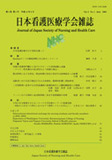Japanese
English
- 有料閲覧
- Abstract 文献概要
- 参考文献 Reference
- サイト内被引用 Cited by
要旨
三交替勤務看護師の蓄積的疲労について、主観的睡眠感の良否による違いを明らかにするために、愛知県A病院、T病院の看護師422名を対象に自記式質問紙による留置法で調査した。有効回答者288名(68.2%)のうち三交替勤務の女性看護師229名について睡眠感得点により睡眠感良好群と睡眠感不良群に分類し、蓄積的疲労や休日の過ごし方、休養充足感について比較検討した。その結果、対象者全体の蓄積的疲労はすべての特性において基準値を上回っており、特に「慢性疲労徴候」「気力の減退」の訴え率が高かった。睡眠感良好群と不良群との比較では、疲労徴候の8特性すべてにおいて不良群の訴え率が有意(p<.001)に高かった。休日の過ごし方に有意差はなかったが、「ごろ寝、何もしない」は睡眠感不良群の方が多い傾向がみられた。休養充足感に有意差はなかった。以上のことから、三交替勤務に従事する女性看護師の蓄積的疲労は高く、良好な睡眠が蓄積的疲労の軽減に有効であることが示唆された。
Abstract
The purpose of this study was to clarify the relationship between cumulative fatigue and feelings of sleepiness in nurses working on three-shift work schedules. The subjects were 229 nurses at two hospitals in Aichi Prefecture, Japan. Subjects were divided into two groups according to OSA global scores; "good sleep" or "poor sleep" groups.
Results were as follows:
Cumulative fatigue symptoms based on the cumulative fatigue symptom index(CFSI)scores were higher than reference levels, particularly for "Chronic tiredness" and "Decreased vitality".
A significant difference(p<.001)was observed between the two groups in each of the eight categories of cumulative fatigue symptoms. Symptoms were stronger in the poor sleep group.
No significant differences were observed between the two groups in terms of how "rested up" subjects felt when they took a day off.
Based on the above results, good sleep would appear critica lto decreasing cumulative fatigue for nurses who are prone to accumulating fatigue, but working three-sift schedules.
Copyright © 2002, Japan Society of Nursing and Health Care All rights reserved.


